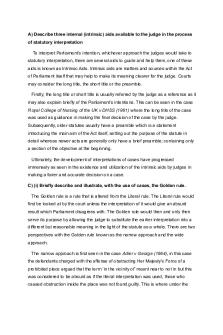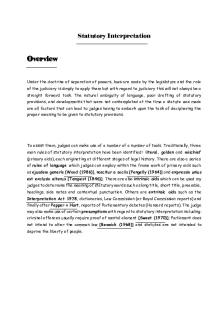Statutory Unconscionable Dealing PDF

| Title | Statutory Unconscionable Dealing |
|---|---|
| Author | iii ooo |
| Course | Arts Law |
| Institution | University of Melbourne |
| Pages | 3 |
| File Size | 103.4 KB |
| File Type | |
| Total Downloads | 86 |
| Total Views | 137 |
Summary
Summary of UCD...
Description
Statutory Unconscionable Dealing To obtain a remedy against [Y] under statue, [X] would seek to rely on either the Australian Consumer Law (ACL) s20 or s21. Section 20 prohibits a corporation engaging in unconscionable conduct in trade or commerce within the meaning of the unwritten law. There is lack of agreement concerning the exact meaning of the section (ACCC v CG Berbatis). If it is only intended to provide the remedies of statue or unconscionable conduct as identified in Amadio, then it will not help [X]. However, the ACL s 21 is wider. It prohibits a person in trade or commerce engaging in unconscionable conduct in the supply of services to a person. ‘Services’ is defined as including rights in relation to [state item/real property]. When determining whether there has been unconscionable conduct for the purposes of the section, a court is entitled to consider the list of matters in s 22. Relevant matters include:
Bargaining positions Whether conditions not reasonably necessary to protect legitimate interests Whether able to understand documents Undue influence, pressure, or unfair tactics Availability of substitute goods or services Conduct with others in similar transactions Relevant industry codes Failure to disclose intended conduct affecting interests, and risks Contract terms Compliance with contract Willingness to negotiate Conduct in connection with commercial relationship under K Right to unilaterally vary K term Whether acted in good faith
Further evidence may show other paragraphs are also relevant. In any event, these factors, particularly [state prominent factor1 ] and [state prominent factor 2] all mean that [X] may be able to establish a claim under the ACL s 21. This would entitle them to a remedy under the Act particularly ss 237 and 243 which would allow a court to set aside the contract. Statutory penalties page 99 notes
Statutory Misleading or Deceptive Conduct
There may be a remedy under the ACL s 18 for misleading or deceptive conduct. In this case
‘Conduct’ includes act (including statements) and omissions: s 2 (2). It therefore catches statements (such as puffery and prediction), and omissions (like silence). Here the conduct is [state] In trade or commerce includes the [business] as there are obvious commercial elements such as [list elements..cost, rent, contracts etc] whether or not carried for profit. This would mean that the nature of the transaction would satisfy the ‘’trade or commerce’’ test from Concrete Constructions v Nelson.
--OR—
Since “trade and commerce” doesn’t include conduct in a private capacity relating to a domestic transaction (i.e. not a business context) or a contract with government, this element will not be satisfied.
It is also necessary to isolate by some criterion a representative member of that class (Campomar Sociedad Limitada v Nike International; ACCC v TPG) and consider the nature of the parties, the character of the transaction and what the parties knew about each other (Butcher v Lachlan Elder Realty). Members of [STATE GROUP aka economist, business people etc.] are expected to take reasonable care of their own interests by paying a reasonable level of attention to information provided. Furthermore, they would not react to the conduct in question in an extreme or fanciful way.
Hypothetical members of the relevant class or the reasonable individual recipient of information may be treated as having some knowledge of the subject matter to which the potentially misleading conduct relates. However, If the object of the conduct are specific individuals – consider the character of the parties, the character of the transaction and what each party knew about the other - Butcher v Lachlan Elder Realty
To mislead is to lead an ordinary member of the community into error. Sales-talk puffery will be misleading conduct if the statement is capable of leading into error in circumstances where the representee may attach importance to the words. There will be no action, however if the puffery was merely introductory in order to attract attention and not be relied upon. Here [include puffery]. The statement may be objectively interpreted as meaning [misleading term] which would breach this section. If a representation about “future matters”, deemed MDC if no evidence adduced of “reasonable grounds”- s 4 of the ACL places an evidentiary burden on a defendant who is alleged to have made a representation as to a future matter that is misleading. This will cover many promises, opinions and predictions. (eg Futuretronics v Gadzhis) Predictions may also be misleading or deceptive in breach of the section where they are made without reasonable grounds. There is no reasonable grounds unless evidence is adduced to the
contrary but there is no onus to prove reasonable grounds (ie onus switches back to plaintiff to prove no reasonable grounds and misleading, after evidence of reasonable grounds adduced) However, reasonable grounds is not an absolute defence. Here, it should be plain to [party] that, if […state reasonable grounds]. Silence will be misleading where there is a reasonable exception that, if a thing existed,it would be disclosed (Demagogue v Ramensky; Miller v BMW). This may be difficult to determine in a commercial setting, and a final decision may depend on the context of the silence. However, “inadvertent” silence, may not constitute conduct and thus may not be capable of contravening s18. It is not settled whether silence needs to be deliberate in order to contravene s 18.Here, however there would have been a reasonable expectation that the [silence must be said]. The silence here was therefore misleading or deceptive. One cannot exclude liability for s18 ( Byers v Dorotea) However, certain types of disclaimers or exclusion clauses may impact on liability under s18 if they have the effect that the conduct in all the circumstances is not misleading or deceptive (eg Butcher v Lachlan Elder); or they have the effect that the plaintiff did not rely on the statement and so has not suffered any loss. Thus, [ ]
Total exclusion - Not effective to defeat MDC claim (for public policy reasons) Merger/entire agreement clause - Not effective to defeat an MDC claim – eg Byers v Dorotea Disclaimer (re content) - Eg. – that the provider of the statement does not warrant its veracity – this may be effective – eg Butcher v Lachlan Elder - Consider wording, timing and prominence Acknowledgement (re non reliance) - Eg – that the recipient of information has made their own enquiries and has not relied on any information provided – this may be effective in some limited circumstances...
Similar Free PDFs

Statutory Unconscionable Dealing
- 3 Pages

unconscionable conduct
- 9 Pages

Unconscionable receipt
- 3 Pages

Unconscionable bargain test
- 8 Pages

Statutory Interpretation
- 6 Pages

Statutory Interpretation
- 6 Pages

Unconscionable conduct - Exam notes
- 11 Pages

Statutory interpretation notes
- 2 Pages

Dealing with Density
- 4 Pages

Statutory Interpretation
- 6 Pages

Statutory Interpretation
- 3 Pages

Statutory Interpretation
- 5 Pages

Statutory Interpretation
- 11 Pages

Negotiated Dealing System (NDS)
- 8 Pages

Statutory Construction Notes_0001
- 32 Pages
Popular Institutions
- Tinajero National High School - Annex
- Politeknik Caltex Riau
- Yokohama City University
- SGT University
- University of Al-Qadisiyah
- Divine Word College of Vigan
- Techniek College Rotterdam
- Universidade de Santiago
- Universiti Teknologi MARA Cawangan Johor Kampus Pasir Gudang
- Poltekkes Kemenkes Yogyakarta
- Baguio City National High School
- Colegio san marcos
- preparatoria uno
- Centro de Bachillerato Tecnológico Industrial y de Servicios No. 107
- Dalian Maritime University
- Quang Trung Secondary School
- Colegio Tecnológico en Informática
- Corporación Regional de Educación Superior
- Grupo CEDVA
- Dar Al Uloom University
- Centro de Estudios Preuniversitarios de la Universidad Nacional de Ingeniería
- 上智大学
- Aakash International School, Nuna Majara
- San Felipe Neri Catholic School
- Kang Chiao International School - New Taipei City
- Misamis Occidental National High School
- Institución Educativa Escuela Normal Juan Ladrilleros
- Kolehiyo ng Pantukan
- Batanes State College
- Instituto Continental
- Sekolah Menengah Kejuruan Kesehatan Kaltara (Tarakan)
- Colegio de La Inmaculada Concepcion - Cebu
